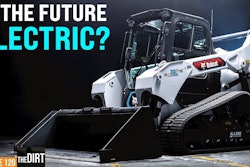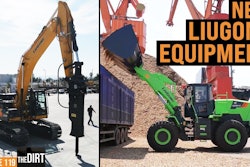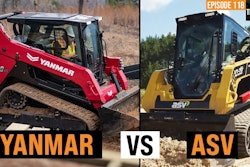All the talk about alternative fuels for reducing carbon emissions on construction sites seems to be overlooking a major potential contender, which is actually further advanced technologically than electric and hydrogen and costs less.
On this episode of The Dirt, we talk about compressed natural gas with guest Shawn Whitacre, Chevron senior staff engineer for engine oil technology. Shawn gives an oil industry perspective on the race to alternative fuels. And his conclusion at this point: “There can’t be and won’t be a single solution.”
For the short term, though, CNG is looking like a viable alternative for heavy-duty construction equipment, one that is already starting to gain traction in the long-haul trucking world. Cummins recently revealing a 15-liter fuel-agnostic engine, which can run on CNG, also makes a strong case for the fuel.
CNG has been used in engines for decades, and refueling infrastructure is in place in many areas.
So could CNG be the next alternative fuel to reach the jobsite?
For the answer to that question and to find out more about compressed natural gas’ benefits as a carbon-reducing technology worthy of the construction site, check out the latest episode of The Dirt.
Equipment World serves up weekly videos on the latest in construction equipment, work trucks and pickup trucks – everything contractors need to get their work done. Subscribe and visit us at equipmentworld.com!
In This Episode:
00:00 - What Does the Future of CNG Look Like?
00:46 - Why Choose CNG Over Other Alternative Fuels?
02:06 - Why Is CNG Already So Prevalent?
03:40 - Why Are Cummins’ Fuel Agnostic Engines Important for the Off-Highway Segment?
06:55 - Does CNG Require Different Engine Oil?
09:23 - What Are the Benefits of Using CNG?
12:23 - Will CNG Become the Mainstream Fuel Source for Construction Equipment?
13:56 - Final Thoughts
Bryan Furnace (00:00):
Today we're back at you with the hot topic of alternative fuels and before you roll your eyes, before you shuffle over to another video, we're coming at it from a different angle because I think when you have something this big that's really going to change the landscape in our industry, you need to get some different perspectives. And so far, we've talked to Cummins. So far, we've talked to other equipment manufacturers, but we haven't talked to any oil companies.
(00:31):
And so today we're going to have Shawn Whitacre, as you guys know him. He's been on here quite a few times. We're going to talk to Shawn about how the oil industry is looking at these alternative fuels and what they see the future being. So in this whole conversation of renewable energy and where we're going to go from a fuel standpoint, especially in the off-highway market, one of my big questions is, "What is the purpose of moving towards CNG, or for those who aren't familiar, compressed natural gas, when you have hydrogen or electric vehicles possibly coming?" Why bother with this compressed natural gas thing to begin with?
Shawn Whitacre (01:09):
Yeah, it's been an interesting dynamic to watch recently, to be honest, really over my entire career. I think one thing we understand here at Chevron, and I think the broader industry is really embracing, is that there just can't and won't be a single solution in this energy transition, this march towards decarbonization. Compared to certain other alternatives that are under development, compressed natural gas engine platforms are not nearly in their infancy like other technologies like battery-electric vehicles, fuel cells, hydrogen combustion engines. Natural gas engines have been in use for more than 30 years in a broad variety of applications, including transportation, but also in things like power generation equipment, construction equipment. There's certainly dynamics that are different now that are making different types of operation pay attention to them than was the case historically.
Bryan Furnace (02:05):
So that was one of my big takeaways from CONEXPO is the overarching conversation of the alternative energies and all of the things that we're moving towards. But one of the really big ones to me was the fact that compressed natural gas is as prevalent as it is currently. We just don't necessarily see it on the off-highway segment, but the infrastructure's there. There's already these proven models, these proven engines that have been functioning just fine. I guess what was a shocker to me is just how close we are to seeing compressed natural gas on the job site versus some of the other fuel sources.
Shawn Whitacre (02:38):
Yeah, and there have been a variety of factors that have motivated that over the years. Some of them, like you mentioned, have been policy related because of certain local requirements for lower emissions or some other policy advocation. Today, we're seeing it just even in users who are looking more broadly for sustainability. Natural gas platforms offer a variety of benefits and those kinds of aspects because you can get to very low tailpipe emissions through the combination of the clean fuel, the combustion advances, and the aftertreatment systems that are pervasive on these kind of platforms. But then you can also pair it up with natural gas that is generated from renewable sources, so you can really have a very low carbon intensity. In fact, renewable natural gas actually is a negative carbon intensity when you look at it from the entire product lifecycle, and that offers advantages to fleets, equipment users that are seeking those advantages as well.
Bryan Furnace (03:39):
So my next question for you, and again this was another takeaway from CONEXPO, and we've interviewed Cummins on this actual show. They came out with this new 15-liter fuel agnostic engine. Can you give us a very brief overview of why that's such a big deal for, in particular, the off-highway segment?
Shawn Whitacre (03:56):
Yeah. So if you look historically for the on-highway sector, it's largely been limited to lower displacement platforms, centrally-fueled fleets, things like waste haulers, city and school buses, anything that could live with the relatively low range. They're centrally fueled, have ready access to fuel, and I think the emergence of the 15-liter platform really signals that we've reached a tipping point in the industry, that it is now being taken seriously by long-haul operators. The 15 liter platform unlocks that 500 plus horsepower realm. You pair that with very long range tanks that are becoming available on the trucks themselves that can take you well beyond 1000 miles.
(04:44):
So some of the things that maybe turned off the trucking industry and the past are starting to become much more palatable and much more attractive solution to them, and anytime where we've seen infrastructure be a hurdle when there's clearly an obvious market, that part of it usually takes care of itself. And we've been very active in this space as have others in building out an infrastructure that will enable this coast to coast. And I think with that level of embracing in the on-highway market, it's going to even become that much more attractive for off-highway builders as well.
Bryan Furnace (05:17):
I was going to say too, in my mind as you were talking through that, when it comes to on the off-highway side, or even in the fork truck industry, we deal a lot more with propane rather than compressed natural gas. But the concept's still the same. We always think of these alternative fuels as being the smaller engines, fork trucks for warehouses and stuff, and when you're talking a 15-liter, 500 plus horsepower engine, you've now opened up the market to loaders, large excavators, bulldozers. There are a number of machines that could run with that engine that previously you wouldn't dream of powering with some alternate fuel source.
Shawn Whitacre (05:51):
Absolutely, and that's clearly the advantage on the trucking side, but like you say on the equipment side as well, because you've got the horsepower and torque that those kind of applications demand now being offered in a natural gas platform. And things like some of the maintenance disadvantages that were historically attached to natural gas platforms have also been solved as well. It's got a lot longer oil drain intervals. You got spark plug change intervals that are much longer than they were in some earlier generations of platforms.
(06:21):
And then you know mentioned the fuel agnostic platforms that are starting to emerge. What engine builders and Cummins and many others are really starting to embrace is that they understand there's a lot of advantages to introducing commonality across platforms because the same service techs that are going to be taking care of diesels will also look after these natural gas engines as well as, in the coming years, probably hydrogen type platforms. And the ability that they can offer that sort of commonality will be just yet another carrot to their success in the marketplace.
Bryan Furnace (06:54):
When we start talking about these alternative fuels, is this something where I'm going to have to have two extra products, three extra products on my lube truck to go service these or what's that oil situation going to look like on these new engines?
Shawn Whitacre (08:22):
Yeah, so historically it has been the case that natural gas engines needed to be lubricated by a unique product, and that is born out of the uniqueness of the combustion and other considerations on board the engine that made diesel engine oils not so suitable for use in natural gas platforms. But there have been evolution in the requirements for natural gas engine oils. There's also breakthroughs in the product that we have where we offer a ultra low ash diesel engine oil that has been developed and demonstrated to also be approved for use in natural gas platforms. And that's breaking a barrier that has been a hurdle for fleets looking for a single product to service both diesel and natural gas. So it checks off one more concern off their list, and that's been real pivotal to customers who are facing that challenge.
Bryan Furnace (09:15):
Absolutely. That's huge to not have to stock yet another thing that we have to keep track of. So that leads me into my next question, perfect segue, is most of the industry, and myself included, for a long time has been very knee-jerk to all of these alternative fuels. "This is just going to be a hassle. It's nothing but negatives. You're creating more logistics issues for me in an industry where we're already plagued with a lot of logistics issues." But that being said, there's also a lot of positives that come out of flipping over to some of these alternative fuels. Could you talk about some of the positives of flipping over to compressed natural gas as a fuel source?
Shawn Whitacre (09:48):
It really, like anything, depends on the types of operation, but a lot of end users who look holistically at the cost of running a natural gas fleet compared to other alternatives find that it's very attractive. So that's not just from the standpoint of the cost of the fuel itself, although that plays into it significantly. They look at other parts of the maintenance and the cost of the platforms, cost to operate over time. They find that there's a cost advantage. One other thing that's pretty significantly different between natural gas engines and modern diesel engines is in the aftertreatment systems. So the emission control systems that are behind these are not nearly as bulky, expensive, and complex as those that are behind today's diesel engines.
(10:35):
Because they operate stoichiometrically compared to lean like a diesel exhaust, they can take advantage of traditional three-way catalysts. So just like you have on a gasoline passenger car, they can control their emissions through a single passive flow through device that doesn't require diesel exhaust fluid, doesn't require some of the other maintenance hassles that are associated with DPFs and no SCR catalyst, have a single device that can take care of the nitrogen oxides, hydrocarbons, carbon monoxide that comes out without much requirement on the end user to keep those maintained. That's been another big attraction to those kind of platforms.
Bryan Furnace (11:14):
That's huge in my mind. Well, if you think about it, one of the major issues that we have in the industry outside of the problems with the aftertreatment systems that we're all plagued with, one of the other chief complaints is the amount of power that you're being robbed of by having so much restriction on the exhaust and the amount of extra fuel burn you have because of not only the restriction, but with a DPF, you're actually feeding diesel into the DPF to burn off the soot.
(11:38):
So you have a lot more fuel burn. And where I go mentally is compressed natural gas, I've heard several different figures thrown around, but let's call it for a round number, 15 to 20% less power from a compressed natural gas engine. But if you don't have the restrictions of the emission system, really what is the net loss in power there? I would almost say that once you remove all of the restrictions of the after treatment system, it's probably not that big of a difference in what you're losing out in order to burn a clean diesel engine of the same size.
Shawn Whitacre (12:10):
Yeah, that's a good comparison. It's becoming a more and more attractive solution to a broader set of the end user base than has historically been the case.
Bryan Furnace (12:20):
So my final question for you is, "Do you foresee compressed natural gas as being more of the mainstream fuel source on a lot of these dirt projects simply because of the lack of infrastructure?" I just don't personally foresee electric becoming the standard in the equipment industry.
Shawn Whitacre (12:36):
Well, I guess I'll just more generally say I don't see any single technology becoming the standard going forward. I think it's going to be very much dictated by the local operation demands and I think is going to be subject to additional breakthroughs. I've seen it countless times over the years where we've looked at certain technologies or concepts that seem insurmountable in terms of challenges, whether those be technical or infrastructure, some other logistical hurdle, that have been overcome. And I think with the industry really rallying behind this diversity of solutions, I think you're going to see all of them win out, depending on the application. And I don't think the construction market's going to be any different.
Bryan Furnace (13:20):
I 100% agree there. I think that's a very accurate statement. It's not going to be a winner takes all. It's going to be a mix depending on the application.
Shawn Whitacre (13:29):
Definitely.
Bryan Furnace (13:29):
Well, Shawn, thank you so much. This has been super informative and it's been nice to get an opinion of someone outside of the equipment industry on a hot take on this new alternative fuels.
Shawn Whitacre (13:40):
Yep. It's a fun space to watch and keeps us busy, but I think it's going to be a very positive thing for the broader marketplace, the environment, and ultimately the businesses that are running this equipment will be the winners.
Bryan Furnace (13:55):
Well, thank you again to Chevron and Shawn coming on the show to give us their perspective on how they see the landscape changing and really what that means for us going forward. Like I said, on something this big, it really is good to get different perspectives. As always, I hope this helps you and your business. I hope it gives you a little more to chew on as we navigate through these new waters in the industry. Thanks for watching and we'll catch you on the next episode of The Dirt.








